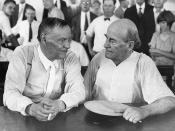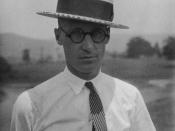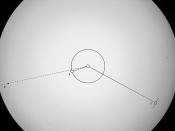The Scopes Trial
Considered a "Duel to the Death" by the people involved, the 1925 Scopes Monkey Trial did not deliver a final verdict on the then controversial issue of evolution being taught in public schools. Jeffrey Moran identifies the 1920's evolutionary debate as "a battle within a much larger cultural war further complicated by urbanism and regionalist tensions between the North and South" (3). One of the stated points of the book is to "clear away some of the clutter left by seventy-five years of historical interpretation of the Scopes trial" (2). While not clearing much of the confusion away, "the volume does sort the arguments into manageable order and does not add to the clutter with a new interpretation." Moran contends that the only real winners in the trial were the monkeys. Zoos reported a huge boom in visitors and pet monkey owners flocked to Dayton, Tennessee looking for business opportunities.
However, the losers were many. Prosecution Attorney William Jennings Bryan, a nationally known politician, found himself labeled a religious bigot and died soon after the trial's conclusion. The famous defense attorney Clarence Darrow was unable to get the jury to find his client innocent. The biology teacher who began the controversy, John Scopes, was forgotten by the end of the trial. Even "the town of Dayton became known as a symbol of backwardness and bigotry, instead of the enterprising image that the town fathers hoped would impress visiting reporters with the New South" (1).
Moran sets the historical background for the trial by examining the cultural scene of the 1920's. He then looks at the founding of the creationist movement and the World Christian Fundamentals Association, and their recruitment of Prosecutor Bryan to lead their campaign. An interesting section follows on the Butler Law which outlawed the...


